Liberi Nantes is the first competitive football club in Italy made up almost entirely of refugees and migrants. Playing in the Terza Categoria—the bottom rung of the Italian football pyramid—the team provides a peaceful space for West African men who survive treacherous journeys from West Africa to Libya and then by sea to the island of Lampedusa.
In this excellent short video, published on The Guardian website, we meet some of the players and Alberto Urbinati, a Lazio fan who founded the club several years ago in response to the plague of racism in Italian football and society. The project has taken on added significance today as Italy struggles to cope with the growing refugee crisis.
Author: Peter Alegi
The Apartheid Football Syndrome
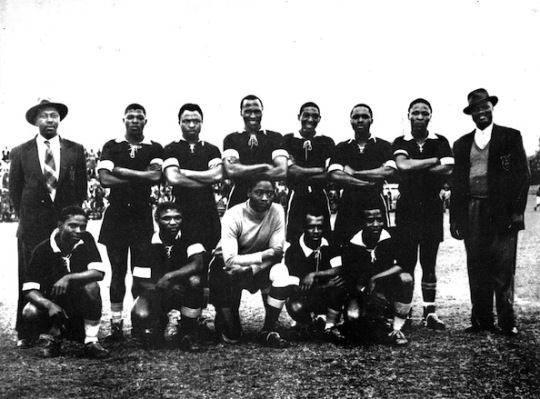
Photo: Durban & District African FA select team, Rhodes Centenary tournament, Salisbury, Rhodesia (1953)
Football is Coming Home is pleased to receive and publish a guest essay by Zipho Dlangalala, a South African fútbologist who has coached players and trained coaches for many years at all levels. He is a teacher by profession. It has been lightly edited for style.
Guest Post by Zipho Dlangalala (makhandaz@hotmail.com)
KWAZULU-NATAL—All sports are played in, and influenced by, past and present social conditions. This is largely, if not entirely, because sport is played by people who are social beings.
When we see most of our South African players playing the same way, looking like identical midfielders, we should know instantly that we are looking at them with “foreign eyes.” They will always look like that as long as we evaluate them with foreign tools and criteria.
To African eyes, it is those midfield players that should reveal the nature and inclination of our players. Their creativity and desire to care for the ball—the uninhibited attraction to artistic modes of play—are great assets that we should have treasured so that their game exhibits the same attributes found in them naturally, at least before being diluted.
Regrettably, the Apartheid philosophy and its legacy was too strong for most of us. Based on seeing life through Master-Slave, Boss-Subordinate, Superior-Inferior, Rich-Poor, Educated-Illiterate, Advanced-Primitive, civilized-uncivilized relationships, this “baaskap” paradigm has engulfed us. Even when we know it is not desirable, we often find ourselves promoting it, advocating on its behalf through actions more than words.
It makes us feel acceptable and progressive to be seen as “the master.” We do everything and anything to feel accepted and to get approval from those who represent “the master” perspective. It has been engraved in us to look for this approval, otherwise we feel we do not have the capacity to stand by ourselves and achieve success on our own. The desire to be associated with, to be affiliated to, approved by, “the master” is hard to resist for most. It is this prevailing mentality in South Africa that undermined indigenous cultures, languages, restricted people’s movement and freedom to associate, to think, to explore, to design, to invent, to discover.
It is a “total control” approach of life. It attempts to control what people think and learn. Given the slightest opportunity, it dictates LIFE to each and every person who is supposed to be subordinated (and limited) to its wishes and desires.
In a cultural and socio-economic environment shaped by a social hierarchy long based on race, fertile ground exists for past tendencies to endure. The more things change, the more they stay the same.
Football under these conditions cannot be sustained, let alone developed.
Looking at football through a particular lens inevitably results in the game looking in a particular manner. Are we using proper African perspectives to look at the game as it is in Africa? Are our views coloured to give us a special feeling? Are we ready to bring something new to world football or are we content to follow established paths and continue to consume what is already in the market? We are entrepreneurs and have skills. We need to develop them and show our own ideas to the world. We need to create something new in our football for the world to sit up and take note.
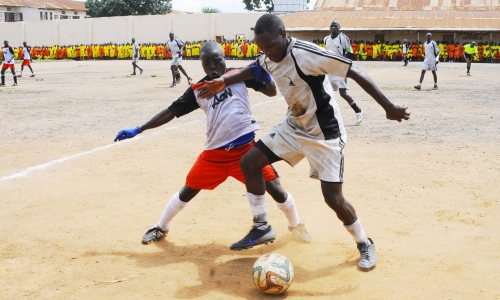
Thieves, rapists and murderers in Uganda’s only maximum security prison play for Manchester United, Arsenal, Chelsea, Barcelona, Juventus, and . . . Hanover 96.
In a gripping podcast recorded in Luzira, a suburb of Kampala, David Goldblatt tells the story of the Upper Prison Soccer Association (UPSA), “the most elaborate prison football league in the world” (listen here).
What emerges form this radio documentary-style piece is a deeply humanistic portrait of a prisoner-run sporting organization that does more, much more than stage occasional kickabouts.
UPSA injects fun, entertainment, and healthy recreation in the otherwise stultifying drudgery of life behind bars. Running it requires hard work, sophisticated organization, and tight discipline. It is a complex, sometimes stressful, affair.
But it works. UPSA helps inmates cope with life on the inside as it strives to transform violent criminals into citizens better prepared for what awaits them after their sentences have been served.
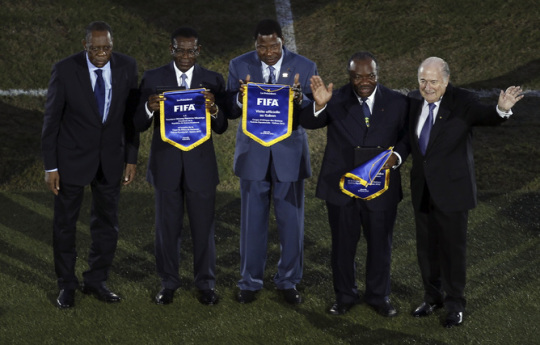
On Tuesday, June 2, Sepp Blatter announced his intention to resign as FIFA president just four days after winning reelection to a fifth term — an electoral victory that simply could not have happened without the support of FIFA’s African members.
According to unofficial calculations, the 133 votes secretly cast for Blatter came from Africa (53), Asia (46), and North America (minus the United States) and the Caribbean (34).
Why did Africans unanimously support the leader of a troubled, even loathed, organization which two days earlier witnessed the arrest of seven of its executives in Zurich on US bribery and corruption charges?
As an academic who has been researching, publishing and teaching the history and culture of African football for two decades, I want to offer a possible answer to this challenging question.
Read full text here at The Conversation.
Thirty years ago, on May 29, 1985, I gathered with a dozen teammates in a living room in Rome to watch the European Cup final between my Juventus and Liverpool. Barely fifteen years old, black-and-white scarf around my neck, there was nothing more I wanted than to avenge our shocking loss to Hamburg in the final two years earlier.
There was reason to be moderately optimistic, partly because four months earlier we had beaten Liverpool 2-0 (Boniek 39′, 79′) to claim the 1984 European Super Cup.
Forty-five minutes or so before the scheduled kickoff in Brussels, I took my seat on the floor. A perfectly unobstructed view of the television screen. Within minutes, disturbing images of chaos at the run down Heysel Stadium started beaming in.
The voice of Bruno Pizzul, a kind of Martin Tyler of Italian football, conveyed bewildering news. Something terrible was unfolding. Death at the stadium? We switched on the radio. Confusion.
Then, slowly, an accumulation of anecdotal reports led to confirmation of an unspeakable tragedy: 36 people were dead (a figure later revised to 39). Almost all Juventus fans. Men, women, and children killed in a stampede and wall collapse in the corner Z sector as they fled a charge by Liverpool supporters.
My heart was in my throat.
Blatteropoly: The ESPN Documentary
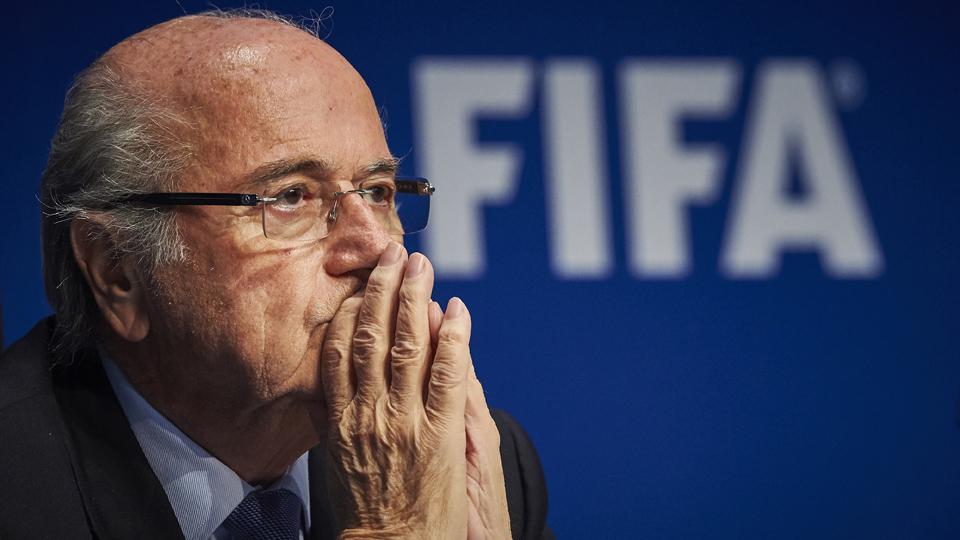
Exquisitely timed for release just ahead of the May 29th FIFA presidential election, ESPN aired an excellent E60 documentary on Sepp Blatter’s governance of world football.
Jeremy Schaap’s piercing investigation deftly uses on-camera interviews with whistleblower Phaedra Almajid, ex-FIFA men like Guido Tognoni, Swiss government officials, and others to probe the murky bid process that granted Qatar hosting rights to the 2022 World Cup. The story digs vigorously into a culture of corruption, fear, intimidation, patronage, and politricks within football’s world body.
Watch the entire show by clicking on each link below:
Part 1: Blatter’s power and Qatar’s World Cup
Part 2: Beginnings of the legend of Blatter
Part 3: Controversy surrounds Blatter’s reign at FIFA
Part 4: Criticism in the UK
Part 5: Challenging Blatter’s power
As an after-viewing treat, I would highly recommend listening to this interview by Sports Illustrated’s Grant Wahl with Jeremy Schaap about making the documentary, lessons learned, and a lot more.
And if you still haven’t had enough, then go ahead and enjoy Last Week Tonight‘s John Oliver lambast the most powerful man in sports! (click here to watch).
Juve and Me
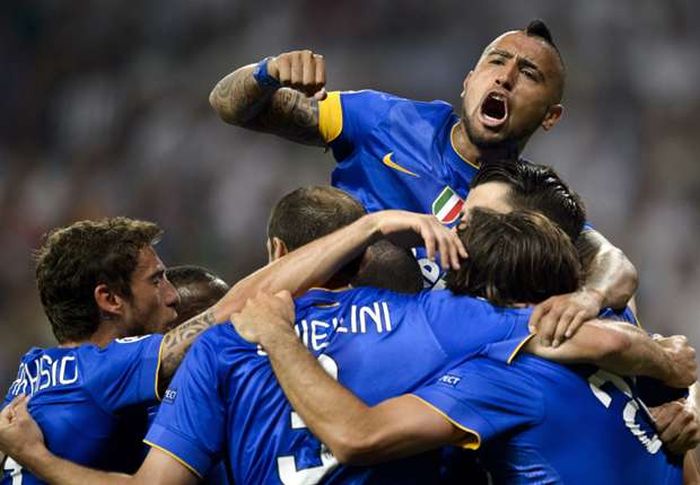
[iOS users click here to listen.]
Juventus, the Old Lady of Italian football, is in the Champions League final for the first time since 2003. In an interview I did a year ago with Austin Long for the Soccer Nomad podcast, I explain how I came to support the bianconeri in the mid-1970s despite being from Rome.
Since I did not live in Turin, I supported Juve from afar and became religiously devoted to Michel Platini and, years later, to Roberto Baggio.
A day after eliminating Real Madrid to earn a date against Barcelona on June 6 in Berlin, it’s funny to hear my rational, realistic assessment of Juve’s prospects for success in Europe alongside my thoroughly irrational dream of winning the European Cup like Milan did in ’94–by thrashing Barca 4-0!